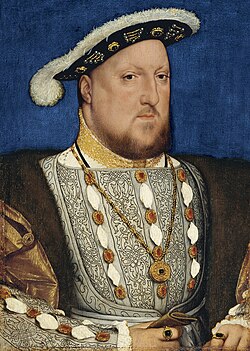Henry VIII
King Henry VIII of England (1491 - 1547) was the king of England from 1509 until his death in 1547. After the death of his father, Henry VII, he was incredibly popular when he ascended to the throne due to his youthful charisma and generosity. As time went on, Henry's ambition had a growing impact on England's economy and foreign policy. His lavish spending on court life, wars, and grand building projects, such as palaces and fortifications, drained the royal treasury. To fund his endeavours, he debased the currency, leading to inflation and economic instability. His foreign policy, aimed at asserting England's power in Europe, involved costly wars with France and Scotland, which yielded few lasting gains.

While Henry VIII was reshaping England’s religious and political landscape, mainland Europe was experiencing the seismic shifts of the Protestant Reformation. Sparked by Martin Luther's 1517 Ninety-Five Theses, the Reformation challenged the authority of the Roman Catholic Church, criticizing its practices like indulgences and advocating for salvation by faith alone.
In his early years, King Henry VIII was a devout Roman Catholic, even earning the title "Defender of the Faith" for opposing Martin Luther's teachings. He persecuted early Protestants and Lollards, seeing them as heretics. However, his desire to annul his marriage to his first wife, Catherine of Aragon, led to a turning point when Pope Clement VII refused his request. It was Thomas Cranmer, a theologian with Reformed sympathies, and Thomas Cromwell, a shrewd political advisor, who orchestrated the break with Rome. Cranmer provided the theological justification for establishing an independent Church of England, while Cromwell managed the political and legal reforms needed to secure Henry’s supremacy over the church. Together, they steered the English Reformation, shaping a movement that far exceeded Henry's personal ambitions, laying the groundwork for lasting religious change in England.
In his later years, Henry VIII became increasingly tyrannical and unhealthy, plagued by obesity and paranoia, leading to the execution of close allies and two of his wives. Despite his personal turmoil and conservative religious views, this did not significantly influence the Church of England, which had already been shaped by reformers like Thomas Cranmer and Thomas Cromwell. While Henry maintained many Roman Catholic practices, the church’s Protestant identity evolved under his successors, particularly Edward VI and Elizabeth I, solidifying a trajectory independent of Henry’s later actions.
Predecessor as King of England: King Henry VII
Successor as King of England: King Edward VI
Wives
Henry VIII married six times, using his control over the Church of England to annul marriages and secure new ones, much to the horror of many other Protestants who viewed such actions as a misuse of religious authority. His six wives were:
- Catherine of Aragon (1509–1533) - Marriage annulled
- Anne Boleyn (1533–1536) - Executed for alleged adultery, treason, and incest
- Jane Seymour (1536–1537) - Died shortly after childbirth
- Anne of Cleves (1540) - Marriage annulled
- Catherine Howard (1540–1542) - Executed for adultery
- Catherine Parr (1543–1547) - Outlived Henry, later remarried after his death